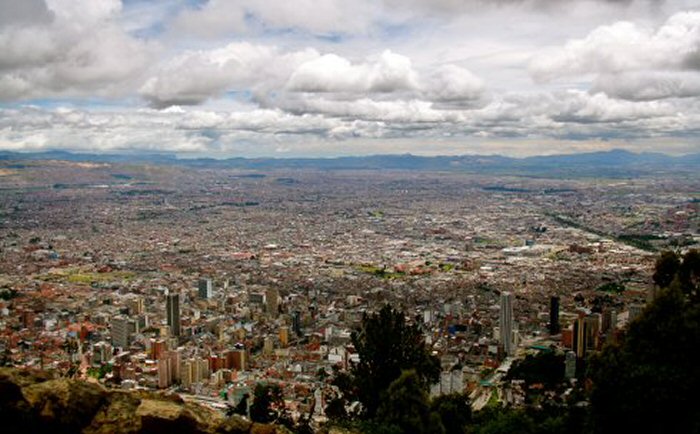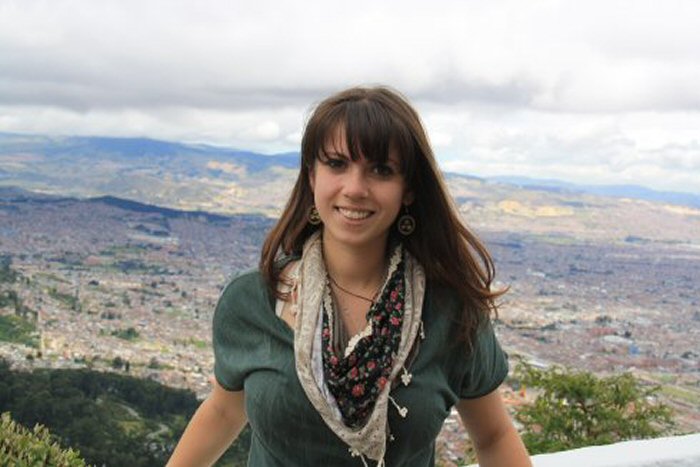Natalie Southwick: Why I Live In Bogotá

Living And Working In Bogotá, Colombia
| advert | Stay Free as a House Sitter. The Win Win for Pet Lovers That Travel
The first time Natalie Southwick visited Latin America was when she travelled to Costa Rica at the age of 14. She has been returning to the region ever since, making stops in eight countries so far, until she finally found “the one” when she moved to Bogotá in January 2012. She’s stayed in Colombia since then, trying to convince as many people as possible to pay her to write and keep living there.
I’m sure you’ve never heard this before: where are you from?
I’m from the good old US of A, born and raised right outside of Boston. Accordingly, I have a lot of opinions about one-way streets, what water temperature is technically too cold for swimming, and various sports rivalries.
And what did you do there, then?
I had a pretty average nerdy adolescence: acquired an absurdly large vocabulary, spent a lot of time riding the T and wandering around Boston, snuck into some concerts, paid for some other concerts and was the only one of my high school friends who fled the East Coast for college — although I only made it to Chicago.
How did you end up in Bogotá?
I originally came here as a volunteer English teacher with a program called WorldTeach. I chose to apply to Colombia, and they assigned me to Bogotá – one of the luckiest things that’s ever happened to me. From day one, I knew I loved it here, and I decided to stay and look for a job after the program ended.
Have you lived abroad before?
Yes – I did your cliché study abroad semester during my junior year of college. I lived in Buenos Aires and traveled around Argentina a bit – it was a great experience, but I honestly prefer Bogotá to Buenos Aires, for a few reasons. People here look at me like I’m completely insane when I say this, but it’s true.
So what’s so good about Bogotá?
Everything! Okay, that’s not actually true. But a lot of things! The typical answer you’ll hear about what makes pretty much anywhere in Colombia great is “the people.” This gets boring as an answer, but it’s consistently true. Colombians are some of the warmest, friendliest, kindest people I’ve ever met, and that’s a huge part of why I love this city.
I’m also just a city girl by nature – I’ve never lived more than five miles from a major city, and there’s something about the energy of the places that just makes me feel balanced. Bogotá has that energy to spare, which makes it a really exciting place to live. The city has about the same population as New York – around 8 million – and it has some of the same all-encompassing feel to it. There are tons of different neighborhoods to explore, great restaurants, creative people, inspiring art (both in galleries and on the streets), and so many opportunities to meet people from all different parts of the country and the world. Plus, no matter where I am in the city, I can always see mountains. And they sell coffee and avocadoes on every street corner – what’s not to love?

And what don’t you like?
There’s no denying that the pollution here is a serious downer. It’s not Beijing-level toxic, true, but it’s visible in the sky and behind the buses barreling down streets and belching black diesel smoke out of the exhaust pipes. There are days when I wash my face and the cotton balls turn an alarming dark shade of grey, which can be alarming. The city is trying to take strides to lessen its carbon footprint, but it has a long, long way to go.
The other big thing is the traffic. Sure, all cities have traffic, but you haven’t really lived in Bogotá until it’s taken you half an hour to go five blocks – or three hours to get home at the end of a long workday, in a packed bus that’s alternately racing down streets and braking so violently you have to clutch your possessions for dear life. Sometimes it’s better just to walk.
Do you feel like an insider or outsider?
A little of both, for sure, but probably still a bit more like an outsider. This has nothing to do with the overwhelmingly welcoming Colombians or the city itself – I have plenty of friends here and have competently managed to do a number of challenging things, from signing up for a health care plan to getting something notarized. Still, while I personally feel very comfortable and happy in Bogotá and certainly don’t feel ostracized, I recognize that, as a foreigner, I don’t have the same claims to a national history or identity that Colombians do. I can respect the great developments that are happening in the country and do my best to be part of them, but they don’t belong to me. I think as an expat, it’s important to remember that even though you feel like you belong in a certain space, that space still doesn’t completely belong to you.
How do you support yourself?
I’m somewhat of a jack-of-all-trades – I divide my time between teaching English classes, doing social media and community manager work, and freelance writing. Ideally, I’d like to be doing as much writing as possible, so I’m trying to move in that direction.
Any advice for wannabe Bogotáns (I’m sure this is wrong. What do you call yourselves?)
Bogotanos is probably the best. (They say “rolos” here, but that’s a very Colombian word. I think Bogotano is your best bet)
Learn Spanish, or commit to learning it when you get here. That’s honestly the single most useful thing you can do. Yes, there are a few people here who speak English, or other languages, but those that speak it well are few and far between, and if you restrict yourself to places where you can get by without Spanish, you’re going to miss out on a ton of awesome things here. Bogotá Spanish is very clear and easier to learn than in many other countries, so even if you’re a beginner, you should be okay.
Also, start feeling comfortable about street food. Street food here is your friend, and sometimes an absolute necessity.
In my opinion, Bogotá is not necessarily a great place to visit as a tourist – it’s not beautiful architecturally like Buenos Aires, packed with world-class food like Lima, or romantic like Cartagena – but it’s a wonderful place to live. There is so much happening here that you’re never allowed to say you’re bored. Explore your neighborhood, find groups of people with similar interests, like restaurants and bars on Facebook, talk to people waiting in line with you and get out of the city to the lovely surroundings. Just say yes to everything and (almost) everyone – maybe, like me, you’ll even end up making friends that invite you to their wedding!
Is the move permanent?
Right now, I try not to treat anything besides gravity as permanent. I’m officially here through the end of December, which is as far as I’ve planned. My visa allows me to stay here until February. Near the end of the year, I’ll decide what 2014 is going to bring. But I’m certainly not in any hurry to leave.
Finally, tell us about something typically Bogotá
Typically Bogotá, if I’m perfectly honest, is making plans with a friend and then having them cancel or get stuck in traffic for two hours, effectively ruining whatever plans you might have had. But let’s be positive for a second! Something that is super typical of Bogotá – and one of my favorite things about the city – is Ciclovía. On Sundays and holidays, the city shuts down hundreds of kilometers of major roads so that people can use them for biking, jogging, rollerblading and walking their adorable dogs. The tradition is wildly popular in this bike-crazy city – they say as many as 2 million people participate in Ciclovía. It’s quite a sight to see the normally congested streets of Bogotá filled with happy people exercising instead, and it’s the best part of most Sundays here.
——————————————————————-
Natalie writes about living in Bogotá on her blog A Year Without Peanut Butter. She can also be found on Twitter @nsouthwick.

Get Our Newsletter. It's Where The Jobs Abroad Are
